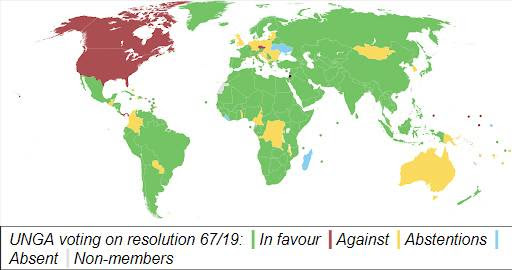Almost every year, draft resolutions related to Israel’s violations of Palestinian rights are discussed and voted on at the UN General Assembly (UNGA) and its subsidiary organ, the Human Rights Council (HRC). While resolutions adopted by UNGA and HRC may not be legally binding, they indicate strong political commitments and show states’ positions. The debate and voting process of such resolutions crucially demonstrate how states behave selectively on human rights issues according to their national interests. European states’ approach to Palestine and Israel is an evident example of such behaviour.
Many European states do not support key UN resolutions about the Israeli violations against Palestine. They usually vote against or abstain from such resolutions, describing these as one-sided steps that would harm possible peace efforts between Israel and Palestine. Germany and the UK – the two biggest European states by population – have taken a clear side with Israel by considering these resolutions unfair and biased. Germany also views its Israeli support as a historical responsibility. Thus, instead, it underscores attacks committed against Israel, calls for such attacks to be condemned, and asks the UN to look at violations in other places.
The UK, which left its mandate in Palestine following Israel’s formation in 1948, has been among the prominent supporters of Israel in Europe. Despite assertedly acknowledging “Palestinian self-determination”, the UK, like the US, has declared to vote against all resolutions about Palestine (under item 7) at the HRC by indicating that this agenda harms peace efforts in the Middle East.
Other major European states do not act very differently and usually abstain from key resolutions on Palestine. For instance, the European Union (EU) countries like Italy, France, Spain, the Netherlands, Sweden and Denmark have not supported the recent resolution requesting the International Court of Justice’s advisory opinion on the legal consequences of Israeli occupation in Palestine, while countries such as Ireland, Belgium and Portugal voted in favour.
The voting for UN Resolution 67/19, adopted in 2012, was critical from a different layer in showing the attitude of individual European states toward Palestine. This resolution upgraded Palestine’s status in the UN to a “non-member observer state”, which was earlier recognised as an “observer entity”. States that did not support the resolution pointed out the prioritisation of direct negotiations between Israel and Palestine based on a two-state solution. The following map shows how the countries voted.
READ: Sharm El-Sheikh summit: Hamas supports escalating resistance against occupation
 [ Source: Wikimedia Commons]
[ Source: Wikimedia Commons]
Today, 138 of the 193 UN member states recognise Palestine as a state, and Iceland and Sweden are the only countries in north-western Europe to recognise Palestine. In terms of taking some practical actions against the Israeli violations, Ireland stands out as a supporter of Palestinian rights among the European states, a behaviour attributed to the shared sense of historical struggles between the two countries. Ireland’s stance is also reflected in its voting behaviour on the Palestinian resolutions.
Despite the opposing and abstaining attitudes, the European Parliament has adopted a resolution that supports “in principle” the recognition of Palestinian statehood. Besides, many national parliaments in Europe have urged their governments to recognise Palestine, although official recognition has not yet occurred. Although the EU, like on several other foreign policy matters, does not act as a political unity on the Israel-Palestine issue, it seeks to develop a common discourse as a permanent observer at UNGA.
European countries opposing the resolutions on Palestine take a different position when human rights violations happen elsewhere. For instance, these countries have taken a clear stance regarding the resolutions on the Russia-Ukraine conflict. They all voted in favour of resolutions like investigating human rights violations in Ukraine and suspending Russia from the HRC. In a similar vein, Western states like the UK and Germany – not to mention the US and Canada – have easily led and supported the inquiry requests on China’s human rights violations against Uyghurs in Xinjiang. The same goes with the EU’s picky sanction policy to which Israel has never been exposed, despite its condemned illegal settlements and other human rights violations. Irish MP Richard Boyd Barrett has well addressed the EU’s double standards on approaching crimes against humanity by mentioning the Palestinian and Ukrainian examples.
READ: UAE provides $3m to rebuild Palestinian town after Israel settler raid
Western European selectivity on human rights is not only confined to the Palestinian case but also has illustrations in the wider Arab Muslim countries. This was evident when Qatar hosted the 2022 World Cup, which was the first time in the 92-year history of the world’s biggest football tournament that a Muslim or Arab country hosted it. Many Western countries and media exerted themselves unprecedentedly to create an overly negative image of the hosting country based on human rights matters, which the Arab League described as a defamation campaign against Qatar.
Political and ideological interests may designate how governments identify and take a stand on human rights issues. In this sense, most reactions towards the Israeli occupation and killings of Palestinians have not been much different. Yet, the Israel-Palestine conflict stands out as a critical example in showing European actors’ contradictory stances and discourses, which blare out human rights matters in selected places and topics, while ignoring others. To counter this hypocrisy, more pressure on the bilateral and international level is essential, not least for Palestinian rights.
Post Disclaimer
Disclaimer: UN resolutions on Palestine and the European selectivity on human rights - Views expressed by writers in this section are their own and do not necessarily reflect Latheefarook.com point-of-view